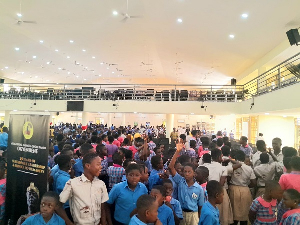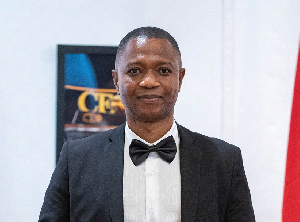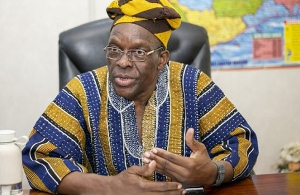The Okyeman Environment Foundation, in partnership with the Ghana Education Service (GES), has established leopard clubs in Kibi in the Abuakwa South Municipality of the Eastern Region.
The event aimed to educate young people in the Akyem Abuakwa Traditional Area about the importance of environmental conservation.
The launch attracted a number of schools, including the Pano Presby School, Kibi Anglican School, Kibi State Primary School, Rock of Ages School, Kibi Demonstrations, and Kibi School for the Deaf, among others.
Held under the theme "Empowering Young Minds on Environmental Conservation for a Sustainable Future," the chairman of the Okyeman Environment Foundation and the Asomkahene of Okyehene, Barima Nana Freduah Agyeman Okotomine, explained that Osagyefuo Amoatia Ofori Panin, the Akyem Abuakwa paramount chief, has a keen interest in ensuring that young pupils who are educated will grow to protect the environment and the vegetation cover for sustainable livelihoods and development.
According to Barima Nana Freduah Agyeman Okotomine, who is also the chairman of the steering committee, the proper education of children is the right step towards appreciating the need for environmental protection.
He said, "If we educate children now, they will grow up with knowledge and thoughts about the importance of protecting diminishing forest cover and vegetation because they have already been taught the hazards that exist when the ecosystem is degraded."
The Asomkahene of Okyehene also expressed regret that they had yet to reach the goal set by the Okyenhene more than two decades ago to protect the environment.
"We haven't reached the goal of 21 years since Okyenhene Nana Amoatia Ofori Panin gave us the task of protecting the environment, which is why we're here to empower these children to become environmental protection agents," he said.
Barima Nana Freduah Agyeman Okotomine declared that in order to encourage the next generation to assume responsibility for preventing environmental degradation, Leopard clubs would be expanded to all schools in Akyem Abuakwa and throughout Ghana.
To guarantee that the goal is reached, a lot of work needs to be done by teachers, coordinators, environmental specialists, and partners.
The Guest of Honour at the event, Godfred Ofoe Caesar, Eastern Regional School Health Education Programme (SHEP) coordinator, stated that over the past decade, communities in the Akyem Abuakwa Kingdom (Okyeman) have faced severe levels of degradation evident with the influx of illegal mining activities, reckless tree felling, and poor agricultural practices, which are rapidly leading to a decline in the sustainable and economic fortunes gained from the resources of their livelihoods.
He asserted that encouraging reforestation and environmental sustainability was a more environmentally friendly way to raise primary school students' knowledge of environmental issues.
"It has been shown that students in schools will play a more active role in environmental preservation and continue to be change agents for a longer amount of time than adults," noted Mr. Caesar.
The SHEP Coordinator stated that the clubs will be a vehicle that allows students to actively participate in choosing and implementing health-related issues while they are in school.
He added that it allows students to become "Agents of Change" who take healthy habits and information from school home and put them into action, influencing their siblings, parents, and friends who are not in school.
According to him, all stakeholders, particularly those in health and education, ought to continue to support the children in school (club members), as it is a long-term plan to disseminate knowledge, education, and communication to community members about a specific activity or exercise.
On her part, Akosua Kwakye, the World Health Organization Ghana's nutrition officer, said that schools and young people were essential change agents and could be effective advocates for environmental and human health protection.
"On the global stage, we are already seeing students and young people mobilize to demand long-term action from their governments at all levels to address the critical climate catastrophe," she said.
She furthered that this example inspires optimism and provides an opportunity to use the power of schools to combat forest destruction, galamsey, and environmental degradation.
"School provides a unique context for preventative interventions, and the several years spent in school are a crucial opportunity to create healthy and sustainable behaviors that can contribute to a lifetime of activism to protect the environment and improve health," she added.
Click to view details



Regional News of Wednesday, 26 June 2024
Source: Michael Oberteye, Contributor

















